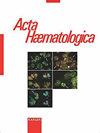在伦巴第大区,博舒替尼治疗慢性粒细胞白血病。
IF 1.7
4区 医学
Q3 HEMATOLOGY
引用次数: 0
摘要
导言:由于对一线 TKI 治疗不耐受和/或耐药,多达 30% 的 CML 患者在随访期间需要更换治疗方案。在这种情况下,博舒替尼(BOS)不仅疗效显著,而且安全性良好,没有绝对禁忌症。方法 为了进一步了解 BOS 治疗的实际情况,我们对隶属于 "REL"(伦巴第血液学网络)的 18 个血液学中心接受 BOS 治疗的 CML 患者的疗效进行了回顾性分析。结果 在 546 例定期随访的 CML 患者中,共有 132 例接受了 BOS 治疗,其中大多数(62.9%)是二线治疗。有趣的是,大多数患者(63.6%)由于对之前的 TKI 不耐受而转用 BOS,而其余 36.4% 的患者则对上一次治疗产生了耐药性。尽管永久停药率为 18.9%,但超过 80% 的患者至少获得了 MMR,7 例患者尝试了无治疗缓解。结论 虽然在这项调查中,BOS 是首选方案,尤其是对之前的 TKIs 不耐受而非耐药的患者,但我们证实,在现实生活中,BOS 是一种安全有效的一线治疗方案。本文章由计算机程序翻译,如有差异,请以英文原文为准。
BOSUTINIB TREATMENT OF CHRONIC MYELOID LEUKEMIA IN LOMBARDY.
Introduction Up to 30% of CML patients will require a therapeutic change during follow-up, due to intolerance and/or resistance to first-line TKI approach. In this context, bosutinib (BOS) has not only demonstrated its effica-cy, but also presents a favorable safety profile, without comorbid conditions representing an absolute contraindication to its use. Methods To gain further into BOS treatment in real-life, we conducted a retrospective analysis on the outcome of CML patients receiving BOS in 18 hematological centers, all belonging to the "REL" (Lombard Hematology Network). Results Of 546 regularly followed CML cases, a total of 132 patients were reported as being treated with BOS, most frequently (62.9%) in second line. Interestingly, most patients (63.6%) switched to BOS due to intol-erance to the previous TKI, while resistance to the last treatment was reported in the remaining 36.4% of patients. Despite a permanent discontinuation rate of 18.9%, over 80% of patients achieved at least an MMR and seven cases were able to attempt treatment-free remission. Conclusion Although in this survey BOS represented the preferred option especially in patients intolerant rather than resistant to previous TKIs, we confirmed that BOS represents a safe and effective therapeutic option be-yond first line in the real-life setting.
求助全文
通过发布文献求助,成功后即可免费获取论文全文。
去求助
来源期刊

Acta Haematologica
医学-血液学
CiteScore
4.90
自引率
0.00%
发文量
61
审稿时长
6-12 weeks
期刊介绍:
''Acta Haematologica'' is a well-established and internationally recognized clinically-oriented journal featuring balanced, wide-ranging coverage of current hematology research. A wealth of information on such problems as anemia, leukemia, lymphoma, multiple myeloma, hereditary disorders, blood coagulation, growth factors, hematopoiesis and differentiation is contained in first-rate basic and clinical papers some of which are accompanied by editorial comments by eminent experts. These are supplemented by short state-of-the-art communications, reviews and correspondence as well as occasional special issues devoted to ‘hot topics’ in hematology. These will keep the practicing hematologist well informed of the new developments in the field.
 求助内容:
求助内容: 应助结果提醒方式:
应助结果提醒方式:


